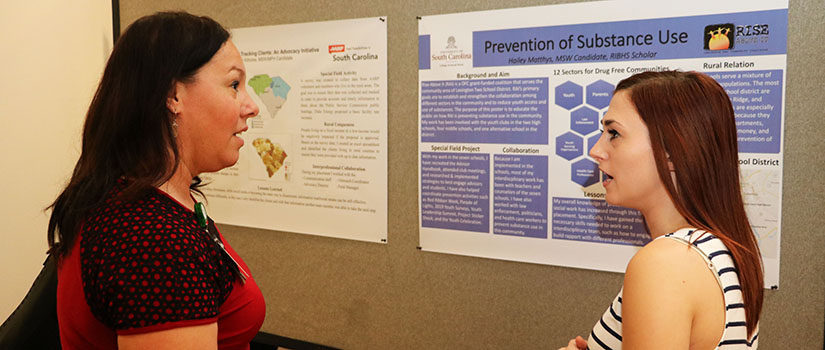May 2, 2019
Chris Woodley • cwoodley@mailbox.sc.edu
The College of Social Work celebrated the work of the 2018-2019 Interprofessional Behavioral Health Scholars at Wednesday’s Poster Fair inside the Hamilton College lobby.
Scholars created posters to visually demonstrate their interprofessional behavioral health work at their field placement. The posters highlighted a special project each scholar worked on during the academic year, including lessons learned regarding interprofessional collaboration and behavioral health. Scholars presented their posters to students, faculty, staff and community partners.
“I was impressed by their commitment to medically underserved populations,” Director of Field Education Melissa Reitmeier said. “They were dedicated to learning more effective ways to practice with not only rural communities but people from those communities who have a different experience with their ability to access health services.”
Of the 30 students who presented, 26 were Rural Interprofessional Behavioral Health Scholars. A four-year (2017-2021) grant awarded by the Health Resources and Services Administration, the RIBHS program aims to develop and expand the behavioral health workforce in rural, vulnerable and medically underserved areas of South Carolina. Alumna Lindsey Kilgo, an adjunct instructor and director of network development for the South Carolina Office of Rural Health, taught an intensive and integrated field seminar to scholars, who are advanced year Master of Social Work students. Each scholar also completed a field practicum at a site to prepare them to implement high-quality, evidence-based rural behavioral health interventions within interprofessional teams with a minimum of two disciplines, such as nursing, pharmacy, medicine, law and education.
“This experience provided additional learning experiences and opportunities,” RIBHS scholar Lainey Mannix said. “It was great learning from Lindsey (Kilgo) and hearing her own personal experiences working with rural populations. There were also a lot of useful discussions.”
Fellow RIBHS scholar Hayley Cannon said she learned about the healthcare limitations facing rural counties.
“I learned about barriers such as services and transportation in class, but my field placement made these limitations even more obvious,” Cannon said. “Being part of something to help further services for rural clients made this a great experience.”
Four students were social work Healthcare Education and Leadership Scholars. Funded by The New York Community Trust, the program educates and trains emerging social workers to strengthen the delivery of health care services nationwide. In partnership with the Council on Social Work Education and the National Association of Social Workers Foundation, the HEALS program goal is to develop the next generation of healthcare social work leaders who will address system-level changes, heighten awareness of prevention and wellness, and address issues of structural racism that are embedded in social institutions.
“I really enjoyed our seminar classes with Lindsey (Kilgo), and her real-life experiences and class discussions were beneficial,” HEALS scholar Sydney Arsenault said. “I also gained insight about everyone's field placements. We liked to say that even though we are all social workers, we come from different field placements and have a different interprofessional lens that we looked through.”
